PENTAGON —
Top U.S. Defense Department officials say the Afghan government's hesitance to approve a bilateral security agreement undermines the resolve of allies and erodes the confidence of Afghan security forces.
Most international troops are set to pull out of Afghanistan at the end of next year after what will be a 13-year presence in the country.
U.S. officials say time is running short for them to start planning whether to leave behind a residual force they believe is crucial to preventing Taliban militants from retaking power.
Those plans are being delayed by the government of Afghan President Hamid Karzai, who wants to wait until next year before deciding whether to sign a bilateral security agreement that would lay out the terms under which the foreign troops could stay.
At a briefing with Defense Secretary Chuck Hagel Wednesday, Joint Chiefs of Staff Chairman General Martin Dempsey said waiting too long undermines the resolve of allies that are considering leaving troops in place.
“We will see an erosion of the coalition, and by the way the other thing we'll see is an erosion of confidence by the Afghan security forces, as they begin to be anxious about whether we're going to be there to support them. So, it really needs to be done now, mostly because what's hanging in the balance in Afghanistan is confidence," said Dempsey.
The United States is considering leaving as many as 12,000 troops to train, advise, and assist Afghan security forces.
The U.S. and NATO are pressuring the Karzai government to approve the security agreement quickly. Washington has warned Afghan officials that it could withdraw all troops at the end of next year - as it did from Iraq in 2011.
General Dempsey said the option of no U.S. troops in Afghanistan could become real.
“I have not been told to plan for a zero option, but clearly I understand that it is a possibility given the current impasse," he said.
U.S. officials had expected Karzai to approve the deal after Afghan tribal elders endorsed it at a meeting last month. The Afghan leader, however, has hesitated, saying he may not sign the accord until after elections are held in April to determine who will be his successor.
Most international troops are set to pull out of Afghanistan at the end of next year after what will be a 13-year presence in the country.
U.S. officials say time is running short for them to start planning whether to leave behind a residual force they believe is crucial to preventing Taliban militants from retaking power.
Those plans are being delayed by the government of Afghan President Hamid Karzai, who wants to wait until next year before deciding whether to sign a bilateral security agreement that would lay out the terms under which the foreign troops could stay.
At a briefing with Defense Secretary Chuck Hagel Wednesday, Joint Chiefs of Staff Chairman General Martin Dempsey said waiting too long undermines the resolve of allies that are considering leaving troops in place.
“We will see an erosion of the coalition, and by the way the other thing we'll see is an erosion of confidence by the Afghan security forces, as they begin to be anxious about whether we're going to be there to support them. So, it really needs to be done now, mostly because what's hanging in the balance in Afghanistan is confidence," said Dempsey.
The United States is considering leaving as many as 12,000 troops to train, advise, and assist Afghan security forces.
The U.S. and NATO are pressuring the Karzai government to approve the security agreement quickly. Washington has warned Afghan officials that it could withdraw all troops at the end of next year - as it did from Iraq in 2011.
General Dempsey said the option of no U.S. troops in Afghanistan could become real.
“I have not been told to plan for a zero option, but clearly I understand that it is a possibility given the current impasse," he said.
U.S. officials had expected Karzai to approve the deal after Afghan tribal elders endorsed it at a meeting last month. The Afghan leader, however, has hesitated, saying he may not sign the accord until after elections are held in April to determine who will be his successor.










